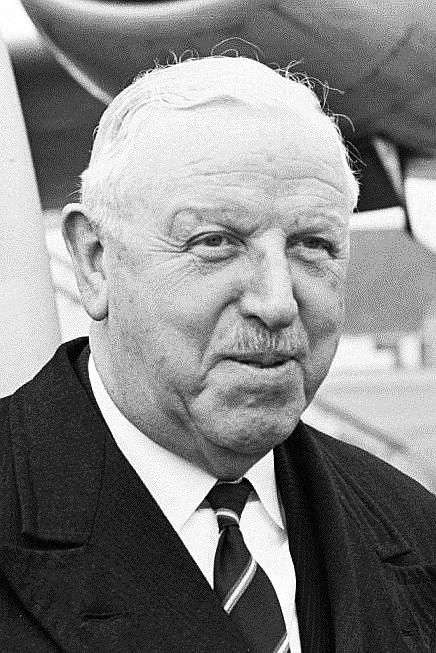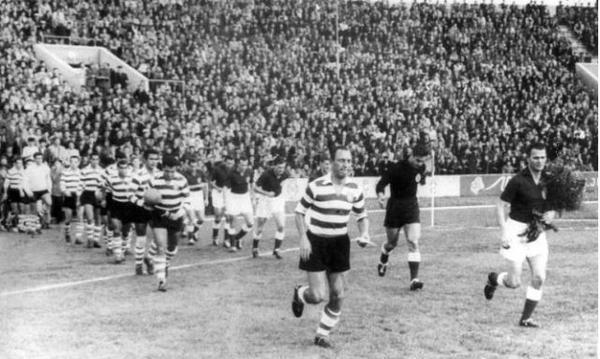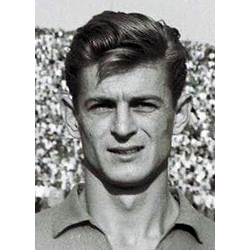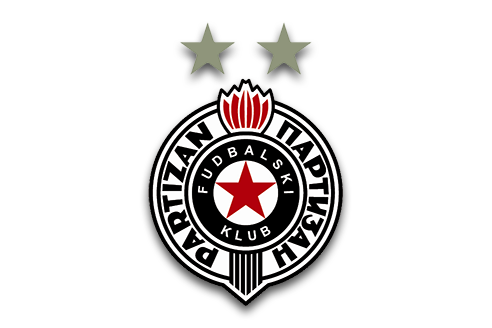Partizan Belgrade in the 1955/56 European Cup | @DusanMih
2025 will see two very significant anniversaries for Partizan Belgrade FC – 80th birthday of the club and platinum jubilee of the inaugural match of the European Cup, the forerunner of UEFA Champions League.
“Non, WOLVERHAMPTON n’est pas encore le ‘champion du monde des clubs’ !“
In the late 1940s and early 1950s, international club football consisted only of international friendlies, rare subregional encounters (e.g. Mitropa Cup) or exhibition matches.
Installation of floodlights and air travel in particular were making it easier for teams to reach destinations across the continent midweek and still be back in time for their weekend league matches.
But the real catalyst for further connectivity of European club football was in the Black Country (albeit unintentionally).
 |
| Wolves take on Honved under the lights at Molineux |
The Daily Mirror declared “Hail Wolves, Champions of the World” after two impressive home wins v Spartak Moscow (4-0) and Honved Budapest (3-2). The latter game in particular (played at Molineux on 14 December 1954, broadcast live on the BBC) was seen as the ultimate sign of Continental footballing supremacy.
Desmond Hackett of the Daily Express concluded: “Wolverhampton Wanderers became Wolverhampton ‘Wondermen’, club champions of Europe when they outfought and finally outplayed the star-spangled Hungarians at Molineux.”
Fleet Street superlatives and Stan Cullis’ swagger had quickly caught the attention and prompted a response from continental Europe.
Gabriel Hanot, former French international (WW1 airman, POW…) and journalist of French sports daily L’Equipe, wrote in his editorial column: “Before we declare that Wolverhampton are invincible, let them go to Moscow and Budapest. And there are other internationally renowned clubs: Milan and Real Madrid to name only two. A club world championship, or at least a European one – larger, more meaningful and more prestigious than the Mitropa Cup and more original than a competition for national teams – should be launched.”
Hanot quickly found allies among his fellow journalists, most notably Jacques Goddet and Jacques Ferran, who had even travelled to South America to learn from experiences of Campeonato Sudamericano de Campeones (predecessor to Copa Libertadores).
Further afield, 7 other European sporting publications have endorsed the L’Equipe initiative, including Marca, La Gazzetta dello Sport, Abola, Mundo Deportivo and Belgrade-based JSL Sport.
On February 3, 1955, L'Équipe released the first set of competition rules with fifteen articles and reached out to major European teams, recognized by Goddet and his editorial team for their distinctive footballing styles, talent and excellence. Almost all of the invited quickly responded, except AC Milan who were experiencing internal issues.
Hanot’s footballing diplomacy also engaged key institutional addresses ahead of the inaugural UEFA Congress scheduled for 2 March 1955 in Vienna. Reception in London was markedly lukewarm (the FA Secretary Sir Stanley Rous advised Hanot to write to individual football associations in each European nation), Germans were mildly positive, though skeptical about practicalities (lack of floodlights and extra burden put on players who are not professionals!), but it was perhaps most significant that the Spanish were particularly keen on the idea.
 |
| Sir Stanley Rous |
“This project appeals to me enormously, and to my friend Santiago Bernabeu, President of Real Madrid,” said Spanish Federation President Juan Touzon.
(Although the original UEFA leadership were still quite reserved - branded as ‘timid’ in a L’Equipe editorial - both FIFA and UEFA eventually recognized the tournament between May and June 1955. Starting from the second edition (in season 1956/57), the European Cup fell under the UEFA umbrella.)
THE FOUNDING CLUBS
The competition which over time developed into what is today the Champions League was officially born on 4 April 1955 in Hotel Ambassador (Boulevard Haussmann) in Paris.
20 representatives of 15 of the most influential clubs in European football (Hibs of all clubs were absent but confirmed that they will participate!) were sat around the table for two days and they decided that 16 teams from 16 countries would play each other home and away in midweek fixtures with evening kick-offs.
The inaugural tournament edition also had to deal with last-minute dropouts. Chelsea did not participate due to a veto (“advisory opinion”) from the FA and were replaced by Polish club Gwardia Warsaw. Honved were replaced by Vörös Lobogó (now MTK). Denmark and the Netherlands also changed their national representatives (Holland Sport passed their invitation on to PSV Eindhoven, while Arhus GF replaced BK Copenhagen).
Dynamo Moscow followed the Soviet FA directive (bad weather and frozen pitches provided as the official explanation) and sat out of the competition in 1955… and 12 following years.
The knockout rounds did not have fixed dates and referees were agreed upon by the two teams. The first European Cup round was arranged without a draw. Real Madrid requested to play against Servette of Geneva, reportedly to pay a visit to the Spanish royal family.
Partizan Belgrade were invited to participate in the inaugural European Cup despite finishing their previous season at a highly disappointing 5th position of the Yugoslav First League. This call was pressumably motivated by Partizan famously beating Honved 3:2 in November 1954, their very impressive performances at pre-season friendlies in France and during January 1954 tour of South America (which included 8:4 crushing of Coco Colo in Santiago de Chile, and draws against Penarol and River Plate). The club international reputation also benefied from the youth team showing at Torneo di Viareggio, where Partizan became first non-Italian winners in 1951.
A WINDY DAY IN LISBON
Fast forward to 4 September 1955, exactly 5 months after the historic meeting in Hotel Ambassador, Paris.
 |
| Sporting Club host Partizan Belegrade in Lisbon |
Estadio Nacional, Lisbon hosted the inaugural competition match in front of 30,000 spectators. Weather conditions were windy. The match was refereed by Frenchman Mr Harzic, whilst the special media correspondent was one Gabriel Hanot.
Our instant massmedia recollection from the day is the iconic photo of captains Manuel Passos and Stjepan Bobek shaking hands, though the game reportedly descended into chaos in the second half – when a general brawl among players forced the game to be stopped for several minutes.
 |
| Portuguese press report on that first European tie |
We can learn about the windy day in Lisbon from several short video clips and scarce reporting of the Yugoslav daily press.
JSL Sport text box of 5 September 1955 reads as follows: “We don’t have more detailed report from Partizan’s match in Lisbon. We couldn’t establish phone connection. Judging by the result, Partizan didn’t do too bad. We can expect Partizan to win in the Belgrade leg and to go through to the next round of the European Cup.”
For the purpose of European football history text books: Sporting’s Joao Baptista Martins scored the competition’s first goal, while Partizan’s Miloš Milutinović (a.k.a. ’Blue Buzzer’) scored the last equaliser (3-3), his second out of total 8 record goals in the European Cup edition.
Accutely unaware of the historic significance, Yugoslav press and general public were more aminated by the news that Partizan destroyed Red Star FC 9-2 on 7 September, whilst waiting for their train connection in Paris.
 |
| Miloš Milutinović |
Four Milutinović goals in the second leg had scheduled the QF tie versus Real Madrid - а serious footballing and ideological clash (club founded by the International Brigade veterans versus the Francoists), first visit of an Eastern European team to Spain after 20 years...
Generations of Partizan fans are brought up on the narrative which served as a prelude to the unfortunate 1966 European Cup Final. Two disallowed Milutinović goals at
Estadio Chamartin (in the 8th and the 10th minute) and a 0-4 defeat. Second leg in the January snow and 3-0 Partizan comeback, which was sadly insufficient to stop Real Madrid on the road to the inaugural European Cup trophy.
Written for @TFHBs by @DusanMih
SOURCES:
- https://crnobelanostalgija.com/2020/04/kup-evropskih-sampiona-1955-56.html
- https://www.sportsjournalists.co.uk/other-bodies/football-writers/wolves-vs-honved-1954-football-media-coverage-history-european-cup-champions-league/
- https://www.wolves.co.uk/news/features/20241213-honved-54-the-night-european-football-was-born-at-molineux/
- https://www.lavanguardia.com/mediterranean/20241220/10226967/european-cup-turns-70-years-old-champions-europe-madrid-equipe-uefa-fifa-football-soccer-1954-anniversary.html
- https://www.theguardian.com/football/2015/jun/30/gabriel-hanot-france-coach-journalist
- https://www.uefa.com/newsfiles/240459.pdf https://www.champions-journal.com/500/on-location







Comments